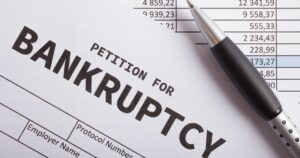When you file for bankruptcy, what is considered disposable income?
No matter which chapter of bankruptcy you choose to file, the courts look at your disposable income and compare it to your monthly debt obligations. Disposable income is that which you can use to pay down debts, and if you have too much disposable income, the court might deny your request for Chapter 7. That being said, you may qualify for Chapter 13, which utilizes a court-approved repayment plan to get out of debt and avoid any further collections from creditors.
Before you try to file for bankruptcy, it is in your best interest to speak with an attorney that handles bankruptcy cases. An attorney will review your financials and see not only if you qualify, but how your disposable income will play a role in your case.
What Is Disposable Income in a Bankruptcy Case?
Your disposable income is the amount of funds you have after you remove allowed expenses from your gross monthly income – this includes your spouse’s income if married. Disposable income determines a lot in bankruptcy. Most importantly, it determines if you can discharge with a Chapter 7 or how your Chapter 13 repayment plan will be set up to pay down those debts.
Allowed Bankruptcy Deductions
To determine your disposable income, you will take your gross monthly income and then remove the bankruptcy court-approved deductions, which include:
- Food and grocery costs
- Rent and mortgage payments (unless you are filing for bankruptcy on a mortgage)
- Utility costs
- Transportation
- Taxes
- Life insurance premiums
- Health insurance premiums
- Payroll deductions
- Family support such as alimony or child support
- Education expenses
- Childcare expenses
- Recurring healthcare costs
Using the Chapter 13 Calculation of Your Disposable Income Form
When you file for Chapter 13, you will complete the “Calculation of Your Disposable Income” form. This form will show you which expenses you may deduct from your monthly income.
The remaining balance (your disposable income balance) is then what the court will want you to use while you create your repayment plan. You have three to five years to pay off all outstanding debts. Therefore, you will need to consider your disposable monthly income and what you can pay each month.
Setting Up a Repayment Plan with Your Disposable Income
When you file for Chapter 13, you are repaying your debts – not discharging them. In this case, you can rope in debts that normally would not apply in Chapter 7, and you also have the court’s protection while paying off those debts. Creditors cannot file lawsuits or harass you for payments once the court accepts the plan and you begin payments.
Your payment plan must be approved by the court. Therefore, you need to consider your total debts and disposable income. Then you should not only pick a reasonable monthly payment that will pay off your debts within that three-to-five-year mark, but also make sure you can stick to that plan.
If the court approves the repayment plan, you must submit your monthly payment to the court. A trustee will then distribute the payment among all creditors in a specific manner.
If you do not submit your payment and you default, then your plan will no longer be valid, the stay of execution is not granted by the court, and creditors can resume collections – including applying for liens, wage garnishments, and other methods to receive repayment.
How Does Chapter 13 Affect Your Credit Score?
Just like filing any other type of bankruptcy, filing for Chapter 13 will impact your credit score, but not as greatly as filing for Chapter 7. Your case will drop off your credit report, which means your score will slowly increase faster than if you had filed for Chapter 7.
Most lenders also prefer to see Chapter 13 than Chapter 7. When you file for Chapter 13, you are telling lenders that you are more likely to pay back your creditors and that you are not just going to discharge your debts when you get in over your head.
Chapter 13 also tells lenders that, if you were to file again, they are more likely to get paid for their debts. Even though they do not receive the full balance in Chapter 13, they receive much more than they would have if you had filed for Chapter 7.
How Long It Affects Your Score Depends on Your Habits After, Too
While you could easily recover just a few years after you finish repaying your Chapter 13 plan, the financial habits you set up will determine how long it impacts your score. If you go right back to running up credit card balances, not paying on debts, and falling behind again, then your credit score will only decrease and you may not get into a favorable score bracket for some time.
Do You Need a Lawyer for Chapter 13 Bankruptcy?
While you could file the paperwork and seek Chapter 13 bankruptcy relief yourself, it is best that you work with an attorney. Attorneys handle these types of cases weekly, and they know how the courts work and what it takes to get a repayment plan approved. You want someone who is ready to fight for your financial well-being in court, but you also need someone who can help you navigate the complicated process of filing for bankruptcy.
While it does cost money to file for Chapter 13, the amount of time you save will repay you in the end. Furthermore, you do not risk having your case rejected, which means you would have to start over, and your credit balances could increase during that time.
We can assist you in finding the right bankruptcy solution that will help you get the financial relief you need when it matters the most. Meet with one of our attorneys today for a no obligation consultation by calling our local office. You can also inquire online about our legal services by completing an on-line contact form.

